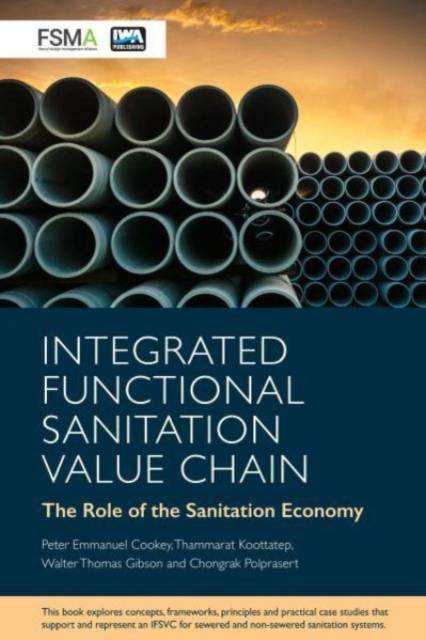
- Afhalen na 1 uur in een winkel met voorraad
- Gratis thuislevering in België vanaf € 30
- Ruim aanbod met 7 miljoen producten
- Afhalen na 1 uur in een winkel met voorraad
- Gratis thuislevering in België vanaf € 30
- Ruim aanbod met 7 miljoen producten
Zoeken
Integrated Functional Sanitation Value Chain
The Role of the Sanitation Economy
Paperback | Engels
€ 83,95
+ 167 punten
Omschrijving
The value chain (VC) system is a key way to address important sanitation technological and institutional gaps in production and service delivery and could constitute a natural platform for development actions and also serve as a market systems approach to improve access to safely-managed sanitation. It has been suggested that sanitation could boost local and national economies and global interconnections with a growing recognition that the private sector can play a bigger role in delivering the Sustainable Development Goal for sanitation, and help businesses understand value-added and product opportunities. This book proposes a pathway towards re-thinking the sanitation value chain (SVC) and suggests that it should cover all processes, activities and products of enterprises/actors in the sanitation supply chain that provide value-added services within each stage. Following the Regenerative Sanitation Principles, this book presents a new perspective to the SVC known as the 'integrated functional sanitation value chain' (IFSVC) to address operational functions within sanitation systems in combination with sanitation enterprises, operators and external actors that support the growth of the sanitation economy. The underlying premise of this book is that the IFSVC represents a new perspective that would have major social, environmental and economic implications for local, national, regional and global sanitation service delivery. It is hoped that researchers, business leaders, entrepreneurs, government officials and funders will find this book valuable, and be inspired and enabled to carry sanitation work forward in their own spheres of operation. The book gives several examples of encouraging developments, particularly in technical and business model innovation. It is our hope that this book will provide the stimulus for new learning and its application, particularly through cross-disciplinary and cross-sector partnerships that bring together all the skills and capabilities needed to deliver a fully effective IFSVC.
Specificaties
Betrokkenen
- Uitgeverij:
Inhoud
- Aantal bladzijden:
- 320
- Taal:
- Engels
Eigenschappen
- Productcode (EAN):
- 9781789061833
- Verschijningsdatum:
- 15/07/2022
- Uitvoering:
- Paperback
- Formaat:
- Trade paperback (VS)
- Afmetingen:
- 156 mm x 234 mm

Alleen bij Standaard Boekhandel
+ 167 punten op je klantenkaart van Standaard Boekhandel
Beoordelingen
We publiceren alleen reviews die voldoen aan de voorwaarden voor reviews. Bekijk onze voorwaarden voor reviews.










